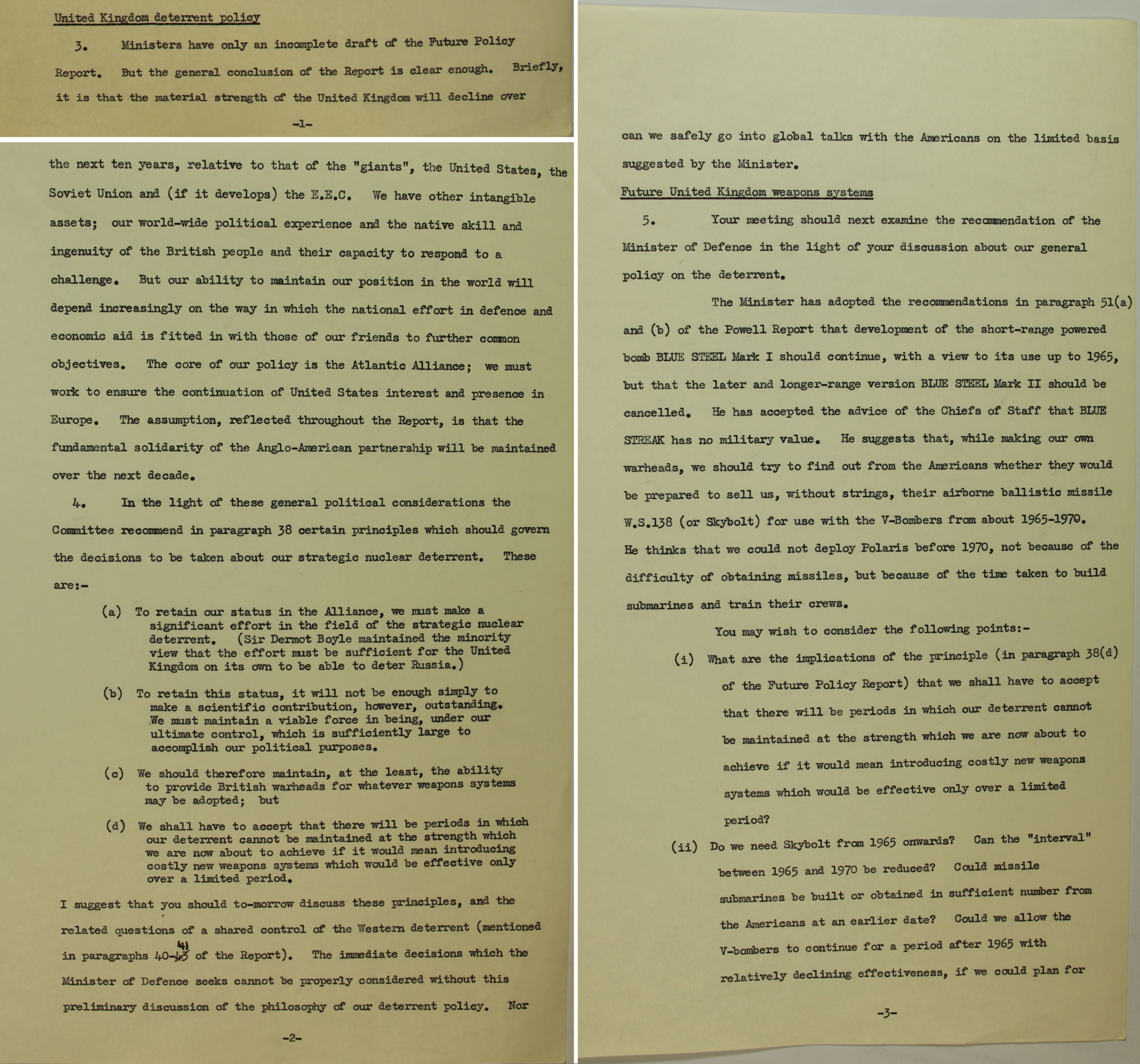
A report examining the future of British defence policy, 1960. (Catalogue ref: PREM 11/2945)
Transcript
…
United Kingdom deterrent policy
- Ministers have only an incomplete draft of the Future Policy Report. But the general conclusion of the Report is clear enough. Briefly, it is that the material strength of the United Kingdom will decline over the next ten years, relative to that of the “giants”, the United States, the Soviet Union and (if it develops) the E.E.C. We have other intangible assets; our world-wide political experience and the native skill and ingenuity of the British people and their capacity to respond to a challenge. But our ability to maintain our position in the world will depend increasingly on the way in which the national effort in defence and economic aid is fitted in with those of our friends to further common objectives. The core of our policy is the Atlantic Alliance; we must work to ensure the continuation of the United States interest and presence in Europe. The assumption, reflected throughout the Report, is that the fundamental solidarity of the Anglo-American partnership will be maintained over the next decade.
- In the light of these general political considerations the Committee recommend in paragraph 38 certain principles which should govern the decision to be taken about our strategic nuclear deterrent. These are:-
(a) To retain our status in the Alliance, we must make a significant effort in the field of strategic nuclear deterrent. (Sir Dermot Boyle mentioned the minority view that the effort must be sufficient for the United Kingdom on its own to be able to deter Russia).
(b) To retain this status, it will not be enough simply to make a scientific contribution, however outstanding. We must maintain a viable force in being, under our ultimate control, which is sufficiently large to accomplish our political purposes.
(c) We should therefore maintain, at the least, the ability to provide British war-heads for whatever weapons systems may be adopted; but
(d) We shall have to accept that there will be periods in which our deterrent cannot be maintained at the strength which we are now about to achieve if it would mean introducing costly new weapons systems which would be effective only over a limited period.
I suggest that you should tomorrow discuss these principles, and the related questions of a shared control of the Western deterrent (mentioned in paragraphs 40-41 of the Report). The immediate decisions which the Minister of Defence seeks cannot be properly considered without this preliminary discussion of the philosophy of our deterrent policy. Nor can we safely go into global talks with the Americans on the limited basis suggested by the Minister.
Future United Kingdom weapons systems
- Your meeting should next examine the recommendation of the Minister of Defence in the light of your discussion about our general policy on deterrent.
The Minister has adopted the recommendations in paragraph 51(a) and (b) of the Powell Repot that development of the short-range powered bomb BLUE STEEL Mark 1 should continue, with a view to its use up to 1965, but that the later and longer-range version BLUE STEEL Mark II should be cancelled. He has accepted the advice of the Chiefs of Staff that BLUE Streak has no military value. He suggests that, while making our own warheads, we should try to find out from the Americans whether they would be prepared to sell us, without strings, their airborne ballistic missile W.S.138 (or Skybolt) for use with the V-Bombers from about 1965-1970. He thinks that we could not deploy Polaris before 1970, not because of the difficulty of obtaining missiles, but because of the time taken to build submarines and train their crews.
You may wish to consider the following points:-
- What are the implications of the principle (in paragraph 38(a) of the Future Policy Report) that we shall have to accept that there will be periods in which our deterrent cannot be maintained at the strength which we are now about to achieve if it would mean introducing costly new weapons systems which would be effective only over a limited period?
- Do we need Skybolt from 1965 onwards? Can the “interval” between 1965 and 1970 be reduced? Could missile submarines be built or obtained in sufficient number from the Americans at an earlier date? Could we allow the V-bombers to continue for a period after 1965 with relatively declining effectiveness, if we could plan for
…
